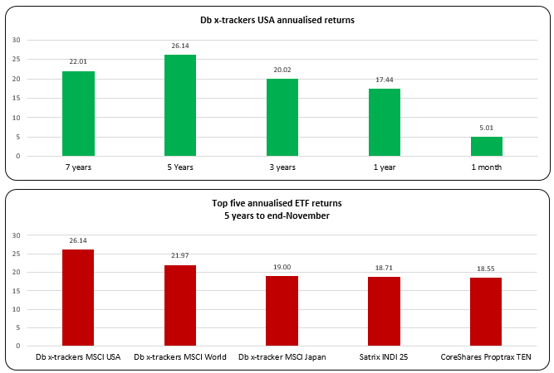Performance Review
International ETFs have proven to be popular among South African investors since Deutsche Bank introduced the first international one to the JSE about 11 years ago. They now hold assets worth R11bn, accounting for more than a third of the total value of the JSE’s equity ETFs.
Their performance remains solid, although the rand’s recent strengthening against the dollar has been negative for returns. As shown on the graph below, three of the best annualised ETF returns over the five-year period to end-November came from international funds.
DBX USA, our focus for this week, was the best performer, growing at an average of 26.14% a year. A key factor is that the rand weakened significantly over that period – five years ago, it was around R8/dollar and is now over R14. But it wasn’t just about currency weakness – the MSCI index in dollars grew 12% a year, slightly above the JSE all share index which grew at 10% a year.

Given the recent turbulence and an uninspiring growth trajectory in the local economy it won’t be surprising if we see increased interest in these ETFs over the coming months. It’s common for investors to seek growth elsewhere if they feel that their local markets are unlikely to yield meaningful growth. Furthermore, diversification across geographies should always be an essential part of any investment strategy. Research shows that geographic diversification can boost the risk-reward profile of a portfolio.
Outlook
The MSCI USA fund contains a diverse portfolio of companies, which collectively generate about 54% of their earnings from the US and the balance from Europe, Asia, the Americas and a little bit from Africa.
Several factors are likely to influence the economic performance of the index with the surprise election victory of Donald Trump certainly a big factor to consider. It is early days and will take some time before there is greater clarity on which of Trump’s campaign promises will result in actual policy change, but the promise of major new infrastructure spending has given an initial boost to US equities.
Concerns over Trump aside, the US economic outlook is healthy enough, with GDP expected to come in this year at 1.8%. The eurozone and Japan are implementing stimulatory monetary policies which are also beneficial to equity markets. In the UK, the Bank of England left the policy interest rate unchanged at 0.25% at its meeting this month but raised its GDP forecast for 2017 to 1.4% from the 0.8% projected immediately after the Brexit referendum.
But for this ETF, the rand exchange rate plays a big part in returns. For now, the market seems optimistic that the rand will maintain its strength, despite many of the negative underlying economic fundamentals. A stronger rand will erode the performance of the ETF.

Suitability
If you have a portfolio with a heavy concentration of local stocks, then db x-trackers USA is worth considering for some global exposure. While it tracks companies listed in US, most of them operate globally. Given that all the underlying stocks will be denominated in dollars, the ETF can also be used by investors who want to cushion their investments against the prospect of a weakening rand.


Top holdings
The MSCI USA is well diversified and is not overly concentrated on one stock. The top-10 holdings make up only 17% of the overall portfolio with the biggest asset, Apple, constituting 3.3%. In terms of the sector weightings, consumer stocks account for 24% of the fund.
Fees
DB x-trackers are among the most expensive equity ETFs on the market. DBX USA has a total expense ratio of 0.86%, more than three times higher than the cheapest ETF on the market.
Alternatives
The closest alternative to the db-x tracker is the recently launched CoreShares SP500. The major difference between the two is that the CoreShares ETF tracks the SP500 while DBX USA tracks the MSCI USA. With an expected TER ranging from 0.55% to 0.65%, CoreShares SP500 will probably work out cheaper than DBX USA. Other foreign-focused funds are the DBX FTSE 100, DBX Japan and DBX World.
About Exchange traded funds (ETFs)
Exchange Traded Funds (ETFs) are passively managed investment funds that track the performance of a basket of pre-determined assets (in this case, US-listed companies). They are traded the same way as shares and the main difference is that whereas one share gives exposure to one company, an ETF gives exposure to more than one company in a single transaction. ETFs can be traded through your broker the same way as shares, say, on the EasyEquities platform. In addition, it qualifies for the tax-free savings account, where both capital and income gains accumulate tax free.
Benefits of ETFs
- Gain instant exposure to various underlying shares in one transaction
- They diversify risk because a single ETF holds various shares
- They are cost-effective
- They are liquid – it is usually easy to find a buyer or seller and they trade just like shares
- High transparency through daily published index constituents

|
Disclaimer
This research report was issued by Intellidex (Pty) Ltd. Intellidex aims to deliver impartial and objective assessments of securities, companies or other subjects. This document is issued for information purposes only and is not an offer to purchase or sell investments or related financial instruments. Individuals should undertake their own analysis and/or seek professional advice based on their specific needs before purchasing or selling investments. The information contained in this report is based on sources that Intellidex believes to be reliable, but Intellidex makes no representations or warranties regarding the completeness, accuracy or reliability of any information, facts, estimates, forecasts or opinions contained in this document. The information, opinions, estimates, assumptions, target prices and forecasts could change at any time without prior notice. Intellidex is under no obligation to inform any recipient of this document of any such changes. Intellidex, its directors, officers, staff, agents or associates shall have no liability for any loss or damage of any nature arising from the use of this document.
Remuneration
The opinions or recommendations contained in this report represent the true views of the analyst(s) responsible for preparing the report. The analyst’s remuneration is not affected by the opinions or recommendations contained in this report, although his/her remuneration may be affected by the overall quality of their research, feedback from clients and the financial performance of Intellidex (Pty) Ltd.
Intellidex staff may hold positions in financial instruments or derivatives thereof which are discussed in this document. Trades by staff are subject to Intellidex’s code of conduct which can be obtained by emailing mail@intellidex.coza.
Intellidex may also have, or be seeking to have, a consulting or other professional relationship with the companies mentioned in this report.
|
|